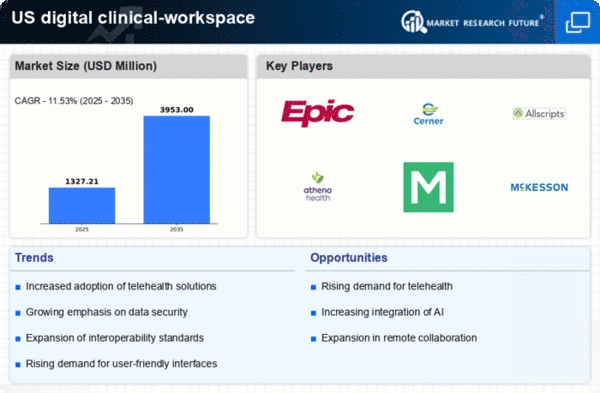Emergence of Cloud-Based Solutions
the digital clinical-workspaces market is shifting towards cloud-based solutions, which offer enhanced flexibility and scalability for healthcare organizations. The adoption of cloud technology allows for the storage and management of vast amounts of patient data while ensuring accessibility from various locations. Recent market analysis indicates that the cloud computing segment in healthcare is expected to grow at a CAGR of 18% over the next five years. This trend is driven by the need for cost-effective solutions that can adapt to the dynamic demands of healthcare delivery. As organizations transition to cloud-based digital clinical workspaces, they benefit from improved collaboration among healthcare teams and streamlined workflows, ultimately leading to better patient care.
Advancements in Interoperability Standards
Interoperability remains a critical driver in the digital clinical-workspaces market, as healthcare systems strive to enhance data exchange capabilities. The push for standardized protocols, such as HL7 and FHIR, facilitates seamless communication between disparate systems, thereby improving care coordination. Recent statistics indicate that organizations with high interoperability capabilities report a 30% increase in operational efficiency. This advancement is crucial for healthcare providers aiming to create a cohesive digital workspace that supports integrated care delivery. As interoperability standards evolve, they enable healthcare professionals to access comprehensive patient information in real-time, ultimately leading to improved clinical decision-making and patient outcomes. The emphasis on interoperability is likely to shape the future landscape of digital clinical workspaces significantly.
Rising Demand for Remote Patient Monitoring
The digital clinical-workspaces market is experiencing a notable surge in demand for remote patient monitoring solutions. This trend is driven by the increasing need for healthcare providers to manage chronic conditions effectively while minimizing in-person visits. According to recent data, the remote patient monitoring segment is projected to grow at a CAGR of approximately 25% over the next five years. This growth is indicative of a broader shift towards more flexible healthcare delivery models, which are essential in the current landscape. As healthcare organizations seek to enhance patient engagement and improve outcomes, the integration of remote monitoring tools into digital clinical workspaces becomes increasingly vital. This shift not only supports better patient management but also aligns with the overall trend of digital transformation in healthcare.
Growing Focus on Patient-Centric Care Models
The digital clinical-workspaces market is increasingly influenced by the shift towards patient-centric care models. Healthcare providers are recognizing the importance of tailoring services to meet individual patient needs, which necessitates the use of advanced digital tools. This trend is reflected in the growing investment in technologies that enhance patient engagement, such as mobile health applications and personalized treatment plans. Data suggests that organizations adopting patient-centric approaches can see a 20% improvement in patient satisfaction scores. As healthcare systems prioritize patient experience, the integration of these tools into digital clinical workspaces becomes essential. This focus on patient-centricity not only enhances care delivery but also fosters stronger patient-provider relationships, which are crucial for long-term health outcomes.
Increased Regulatory Compliance Requirements
the digital clinical-workspaces market is impacted by the evolving landscape of regulatory compliance. Healthcare organizations are facing heightened scrutiny regarding data privacy and security, particularly with the implementation of regulations such as HIPAA and HITECH. Compliance with these regulations is not merely a legal obligation; it is also a critical factor in maintaining patient trust. Recent findings indicate that non-compliance can result in fines exceeding $1 million, underscoring the financial implications of regulatory adherence. As a result, healthcare providers are investing in robust compliance solutions that integrate seamlessly into their digital clinical workspaces. This focus on compliance not only mitigates risks but also enhances the overall integrity of healthcare delivery systems.
















